Two War Conferences in Halifax Vigorous Opposition in Halifax to
Imperialist War
Preparations
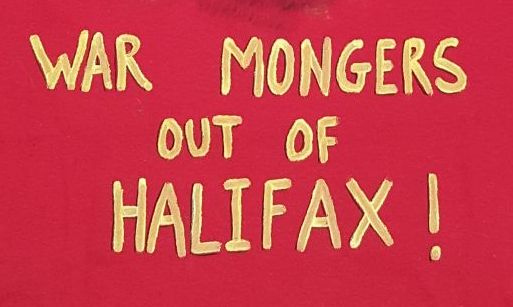 TML Weekly
congratulates all those who are
contributing to expressing the opposition of Canadians to the
imperialist war preparations at the war conferences organized in Halifax
this week, the International Security Forum which is conducting its
proceedings in Halifax for the tenth year in a row from November 16 to
18 and NATO's Parliamentary Assembly which is conducting its proceedings
in tandem from November 16 to 19. Special thanks to the organization No
Harbour for War which takes the initiative to make sure the city of
Halifax and its harbour are not used for purposes of promoting
imperialist war or
engaging Canadians in the imperialist war preparations. Special
appreciation also for all activists from all walks of life who see the
necessity to speak out on the important questions of war and peace at a
time grave dangers face humanity which only the peoples united on the
basis of their own nation-building aims and the affirmation of their own
conscience can avert. TML Weekly
congratulates all those who are
contributing to expressing the opposition of Canadians to the
imperialist war preparations at the war conferences organized in Halifax
this week, the International Security Forum which is conducting its
proceedings in Halifax for the tenth year in a row from November 16 to
18 and NATO's Parliamentary Assembly which is conducting its proceedings
in tandem from November 16 to 19. Special thanks to the organization No
Harbour for War which takes the initiative to make sure the city of
Halifax and its harbour are not used for purposes of promoting
imperialist war or
engaging Canadians in the imperialist war preparations. Special
appreciation also for all activists from all walks of life who see the
necessity to speak out on the important questions of war and peace at a
time grave dangers face humanity which only the peoples united on the
basis of their own nation-building aims and the affirmation of their own
conscience can avert.
A militant rally was held at the popularly renamed Peace and Freedom
Park on November 17 to condemn the Halifax International Security Forum
(HISF), being held in the Westin Hotel for the 10th
successive year. Demanding that the HISF be banned, the rally also
called on Canada to get out of NATO and NORAD, demanded that all foreign
warships be banned from Halifax Harbour and that Halifax be declared a
Zone of Peace. These demands are considered
central to realizing an anti-war government that can ensure Canada is a
genuine factor for peace and justice in the world.
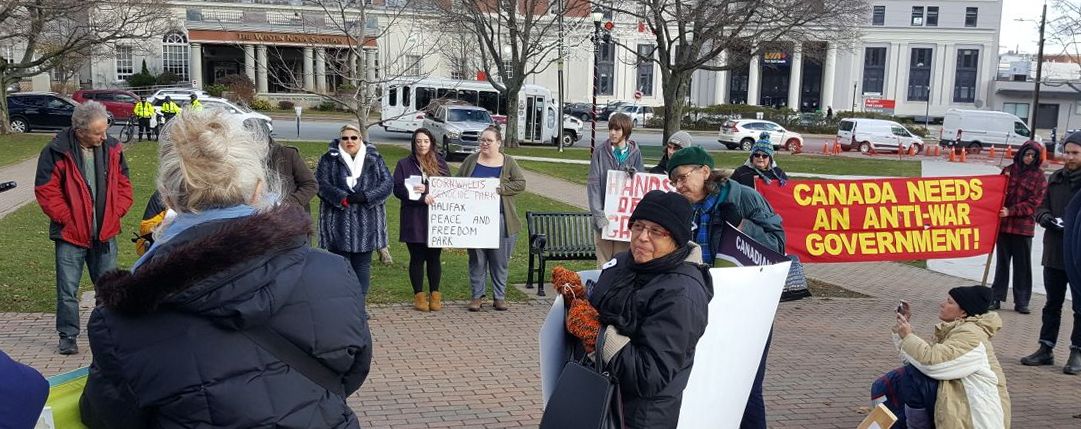
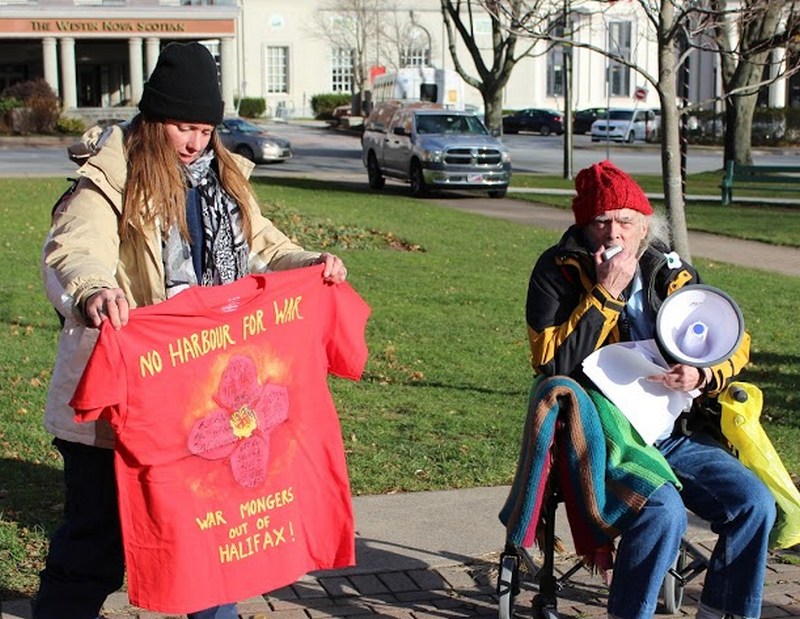 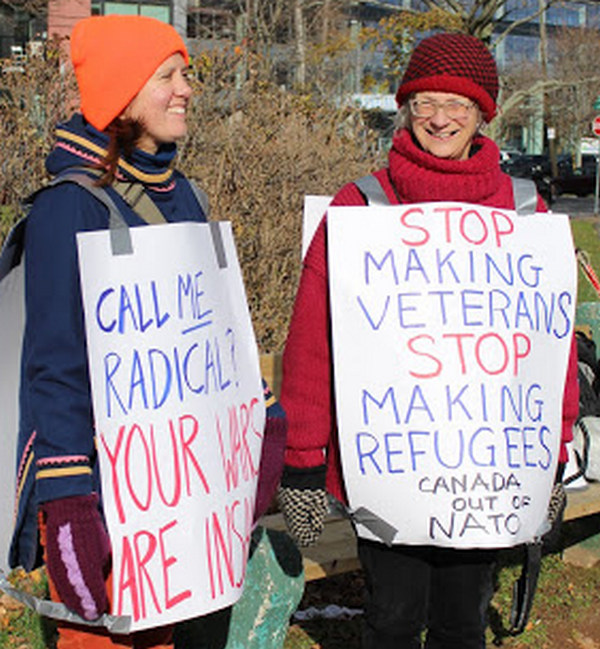
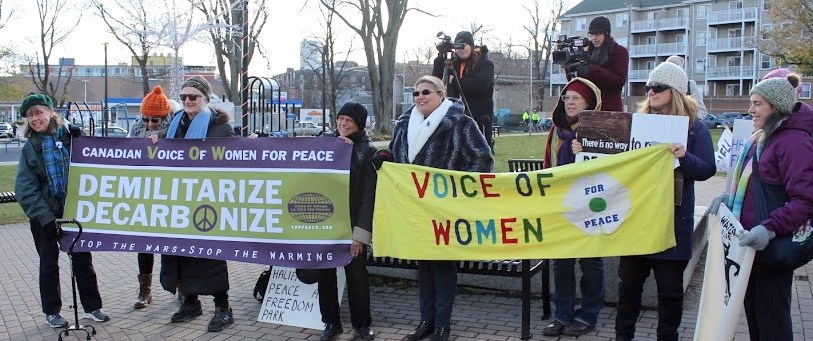
Activists rally at Peace and Freedom Park against the war conferences in
Halifax, November 17, 2018. The war conferences have been militantly
opposed each year since they began in 2009.
Other than the use of the name Halifax, the HISF has no
organic connection
with Halifax. Everything is organized from Washington, DC, where the
HISF has established its headquarters since 2011 as a
separate entity. The Canadian Department of Defence has given some 30
million tax dollars in funding to the U.S. organizers since 2009. It
claims the aim of the "discussion" is to "learn from each other, share
opinions, generate new ideas, and put them into action."
The agenda items discussed serve as weapons for the U.S.
government in its confrontation with the world it strives to dominate.
They are a specialized mechanism responsible for mobilizing high-ranking
U.S., Canadian and international
officials, especially military, and selected ideologues,
journalists and organizations for hegemony and war. In this regard, the
agenda at this year's forum reveals attempts by the imperialist forces
to cloak NATO's war aims.
The overall tone can be seen in a topic at this year's
gathering on the 100th anniversary of the end of World War I, "100 Years
On: Are We Tired of Winning?" It is a telling
indication of the outlook the organizers promote.[1]
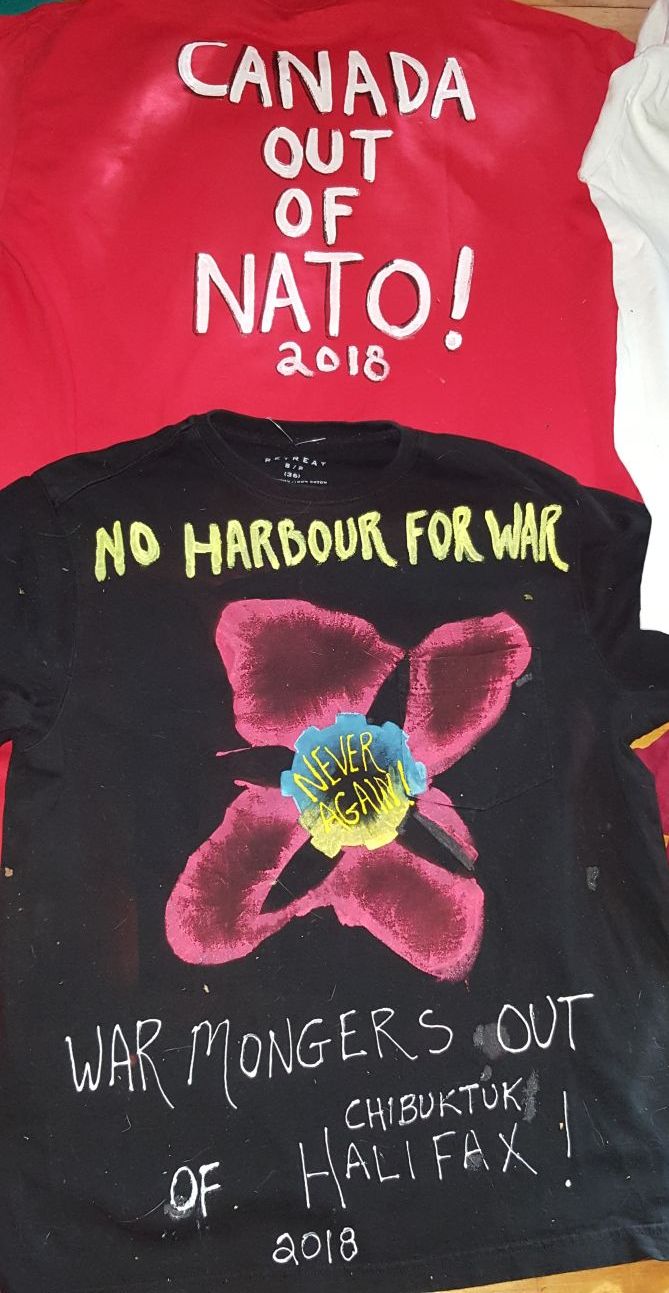 In
tandem with the HISF, the second war conference, the NATO
Parliamentary Assembly, serves the same aims. It brings together 600
politicians from the 29 NATO bloc member countries, as well as delegates
from partner countries "to discuss international security issues." The
Parliament of Canada is hosting this warmongering conference but other
than that, its agenda has nothing to do with what the Canadian polity
needs at this time and is also set in secret abroad within the corridors
of power of the aggressive U.S.-led NATO alliance. In
tandem with the HISF, the second war conference, the NATO
Parliamentary Assembly, serves the same aims. It brings together 600
politicians from the 29 NATO bloc member countries, as well as delegates
from partner countries "to discuss international security issues." The
Parliament of Canada is hosting this warmongering conference but other
than that, its agenda has nothing to do with what the Canadian polity
needs at this time and is also set in secret abroad within the corridors
of power of the aggressive U.S.-led NATO alliance.
"It's not by chance that they're here on the same
weekend,"
boasted Peter Van Praagh, President of the HISF. "This NATO
Parliamentary Assembly chose Halifax this weekend precisely because of
the people who would be at the Halifax International Security Forum.
Some of our experts and speakers are going over to educate and discuss
things with the legislators while they're in Halifax."
"A major event will be a parliamentary debate and
adoption of
the resolutions presented in the committees on the High North, hybrid
warfare, burden sharing, deterrence, space, energy, the South, defence
innovation and Russian election meddling," the Canadian Press reports.
The Plenary session on November 19 will be addressed by
Assembly President Rasa Jukneviciene, NATO Deputy Secretary General Rose
Gottemoeller and other senior officials, its media department informs.
NATO is, amongst other things, currently engaged in a
high-powered campaign to celebrate the 70th anniversary of its founding
on April 4, 2019. The agenda of the HISF and of NATO's Parliamentary
Assembly are examples of more to come as NATO uses every occasion to
promote the war aims of this aggressive
U.S.-led alliance in the name of peace, freedom and
democracy.
NATO also works in conjunction with governments and has
always had a hand in formulating the political structures which are to
be permitted in not only Europe, the United States and Canada but, since
the collapse of the former Soviet Union and former peoples'
democracies, in all countries which are deemed to be democratic and not
subject to regime change by the NATO bloc. In 2017, a meeting of NATO
Ministers of Defence held in Brussels, on November 8 and 9 approved the
outline design for an adapted NATO Command Structure and officially
launched the expansion of NATO's cyber warfare program and the inclusion
of cyber attacks in the collective defence provisions of Article 5 of
the Alliance's Charter. This is germane to the agenda items being
discussed at this time by the representatives of the biggest private
interests, the think tanks, military commanders and parliamentarians
whose main mission is to provide arguments for wars which favour the
U.S. imperialists and their allies. The stated aim
of the new command structure is to "improve
the movement of troops across the Atlantic, and within Europe." Emphasis
was placed on member nations' submission of their infrastructure
planning and procurement to move troops and military equipment rapidly,
including across the national
boundaries of its members and partners. Although presented as being for
purposes of defence it clearly shows that NATO is preparing to move its
troops and equipment against those it declares enemies. That meeting
presented as vital the need to update military requirements for civilian
infrastructure, such as roads, railways and airports. TML Weekly
pointed out at that time: "This means there will be more demands that
the national governments of NATO member and candidate member states
submit civilian infrastructure, both existing and planned, to NATO
Command." NATO added at the time that not only governments but the
private sector and the European Union "have key roles to play."[2]
NATO Secretary General Jens Stoltenberg, during a press
conference following the 2017 meeting of NATO Defence Ministers, stated
that
since 2014, NATO has "made good progress in improving national
legislation, removing many bureaucratic hurdles to allow us to move
forces across Allied territory. But much more needs to be done. We need
to ensure that national legislation facilitating border crossing is
fully implemented. We need enough transport capacity at our disposal,
which largely comes from the private sector. And we need to improve
infrastructure, such as roads, bridges, railways, runways and ports. So
NATO is now updating the military requirements for civilian
infrastructure."
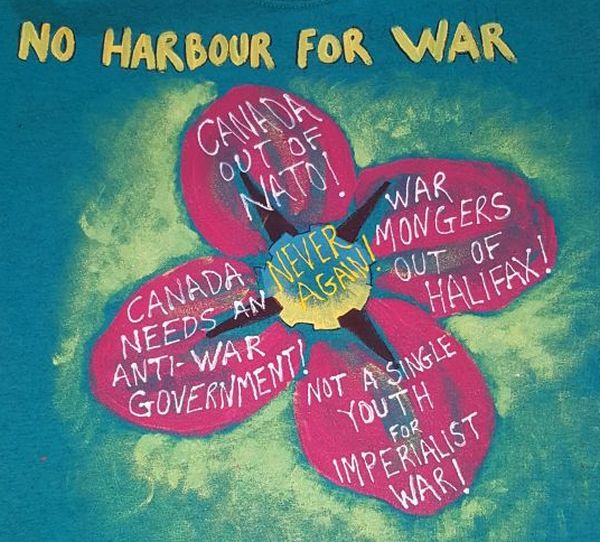 Stoltenberg
later explained that NATO was going to be
dictating changes to the laws of member states to serve rapid deployment
for war: "It's about legislation, and of course it's about making sure
that NATO allies implement those standards and those requirements. We
formulate the requirements and the
standards, but of course it's nations that have to implement them when
they invest in infrastructure, when they make arrangements with, for
instance, private providers of transportation." Stoltenberg
later explained that NATO was going to be
dictating changes to the laws of member states to serve rapid deployment
for war: "It's about legislation, and of course it's about making sure
that NATO allies implement those standards and those requirements. We
formulate the requirements and the
standards, but of course it's nations that have to implement them when
they invest in infrastructure, when they make arrangements with, for
instance, private providers of transportation." TML Weekly
also pointed out at that time: "This raises the possibility that NATO
will demand private transport monopolies, for example in rail, come
under its military control for purposes of moving NATO equipment and
troops. If and when workers act to oppose the deployment of foreign
troops in their countries they will be labelled as foreign agents or
worse. It raises concerns for Canada specifically as the U.S. considers
Canada a transit point for deployment of its forces to Europe. It may be
that in building new transport corridors standards will be imposed to
ensure that roads, bridges and the like are capable of carrying U.S.
military equipment for deployment for war in Europe."
Since 2017, the arrangements NATO is making and which governments
are adopting are moving very fast. The reforms the Trudeau government has made to the Canada Elections Act
as
concerns third-party financing and who decides what conscience Canadians
are allowed to express without being criminalized and considered enemy
agents is all being set in law before our very eyes. The political
parties which form the system of cartel party government are without
exception part of this militarization of life itself and they must not
be let go scot-free. It raises the serious issue of how and why
governments and political parties which have no connection with the
people's will, including their opposition to war and aggression, should
be permitted to take their marching orders from the aggressive military
alliance NATO.
The NATO Parliamentary Assembly is part of the pervasive
militarization of life facing the peoples of NATO member
countries. The peoples of these countries are already
disempowered through the use of electoral laws and elections and
political systems that deprive them of having any say in the matters
that affect them. The NATO Parliamentary Assembly claims that it serves
"as an essential link between NATO and the
parliaments of its member nations" and "works to build
parliamentary and public consensus in support of Alliance
policies. The NATO Parliamentary Assembly deals with social, cultural,
political and economic issues, as well as military matters of paramount
importance to NATO member nations.
Parliamentarians meet and share information during regular Assembly
sessions in North America and Europe."
This is true. This is what the NATO Parliamentary Assembly
does. Let the people be warned! Let the people beware!
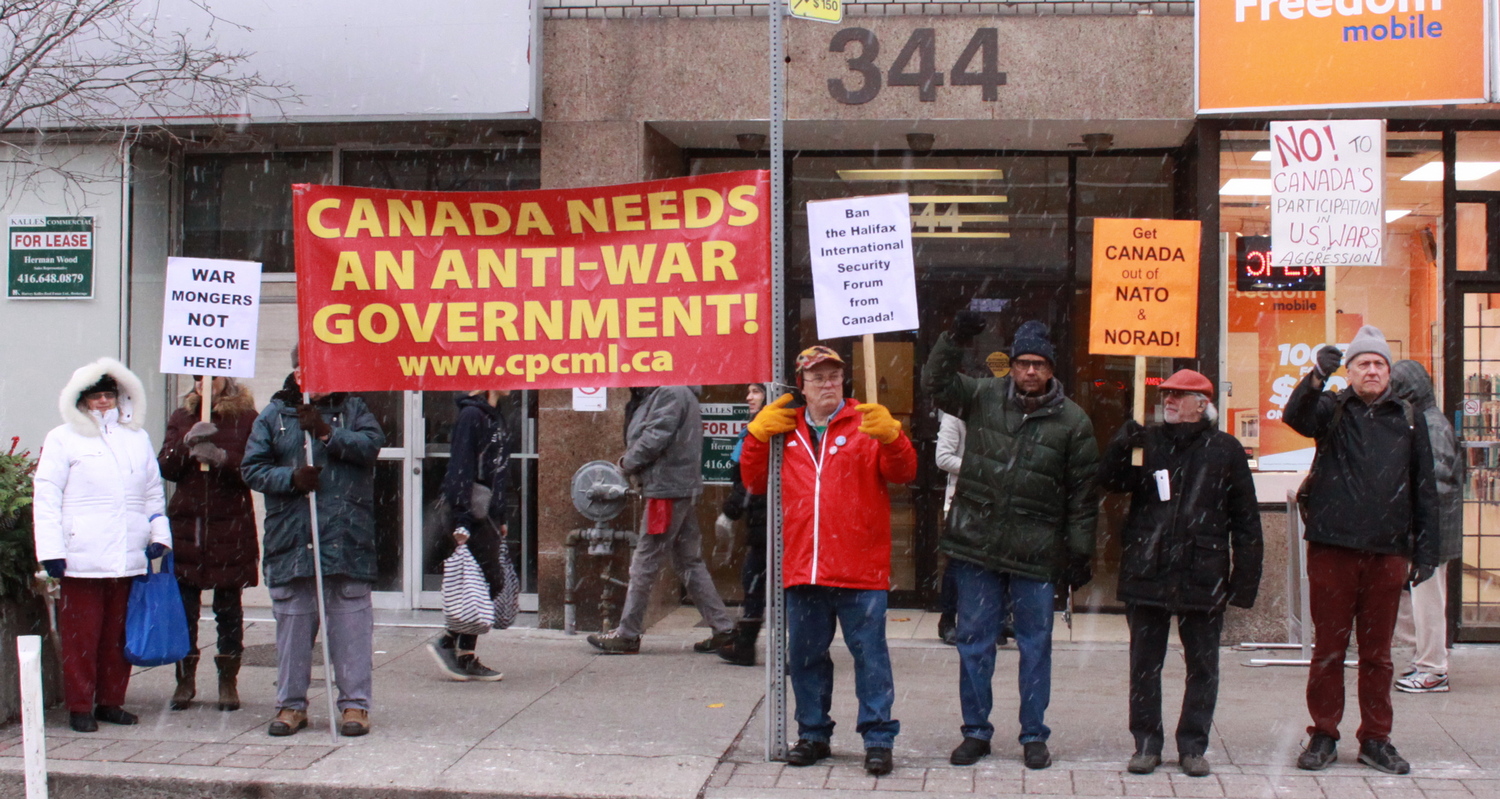
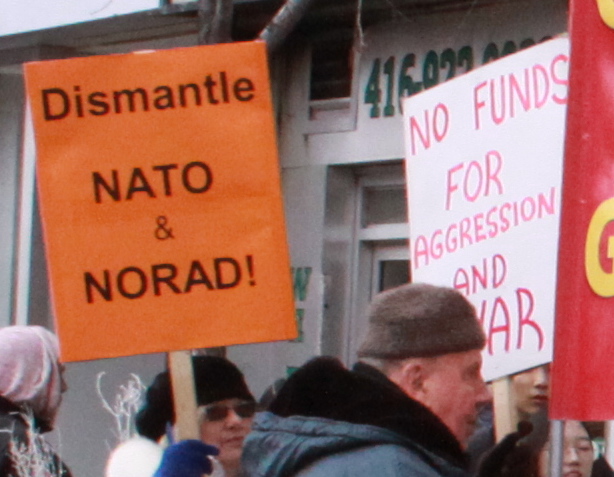 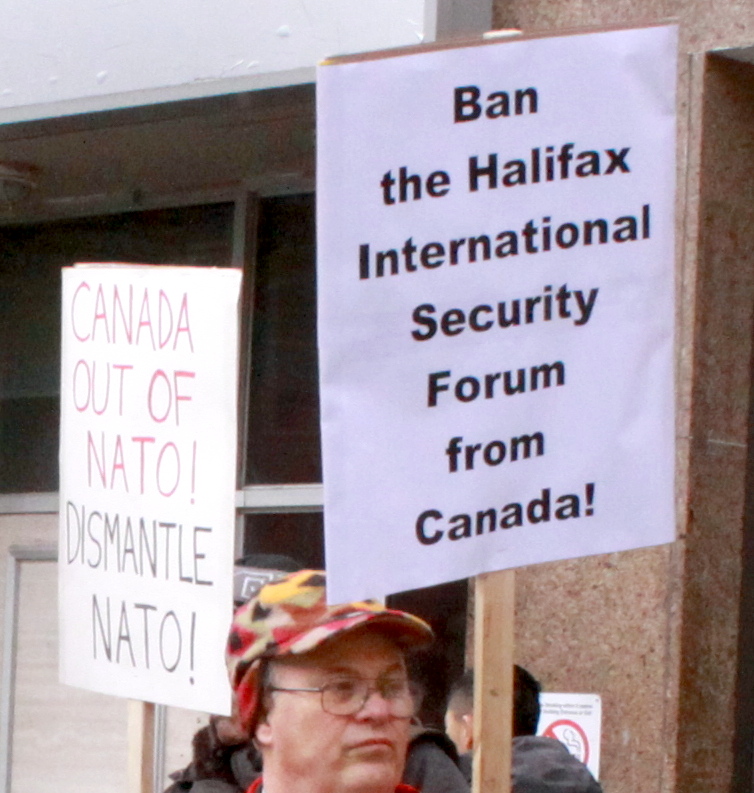
Toronto picket against the Halifax war conferences, outside Foreign
Minister Chrystia Freeland's constituency office, November 17, 2018.
Note
1. Topical Agenda of the 10th Halifax
International Security Forum:
Plenary Sessions (On-the-Record)
100 Years On: Are We Tired of Winning?
Present Tense: Treachery in Tech, Trouble in Trade
Asia Values: A Free and Open Indo-Pacific
Inclusive Security: Playing the Winning Team
Beijing's Cravings, Kremlin's Gremlins: Freedom's Foes
Migration Aggravation: Failing States Flooding Borders
UN-specific: Aging Institutions, Modern Solutions
Future Tense: Our World in Ten
Informal Sessions (Off-the-Record)
Afghanistan: Pivot of Asia
Africa: Global Security's Next Big Story
After Brexit: EUphoria or EUlogy?
Climate Consequences: It's the End of the World as We've Known It
Curbing Corruption: Global Magnitsky
Demography: Destiny's Child
Energy: What's New Under the Sun?
Germany and its Alternatives
Globalizing Dignity: Democracy Works
How Do You Solve a Problem Like Korea?
Indo-Pacific Security: Battle of the Billions
Iran: Protection by Pulling Out?
Mayhem, Massacre, Misery: MidEast Makeover
Monroe's Doctrine Disinterred
Nafta My Own Heart: Friends With What Benefits
NATO Plus Two Per Cent
Oceans 1: Our Collective Resource
Populism: Popular?
The Quad Squad: Asia's Democracy Defenders
Syria: Sorry
Targeting Tomorrow's Terrorists
Tech: America's Great Inventions, Its Enemies' True Intentions
Testing Turing: AI Update
USA: USA! USA! USA!
Vancouver Peacekeeping Initiatives: Mali and More
Venom in Venezuela
Water Everywhere: Where's a Drop to Drink?
Wavering on Uighurs, Firmer on Burma: Where Muslims Are Minorities
2. "Dangerous Expansion
of
NATO
Powers
and
Authority," TML Weekly, December
2, 2017.
(November 17, 2018 - No. 40 )
Return to Index on Ukraine
Website: www.cpcml.ca
Email: editor@cpcml.ca
|